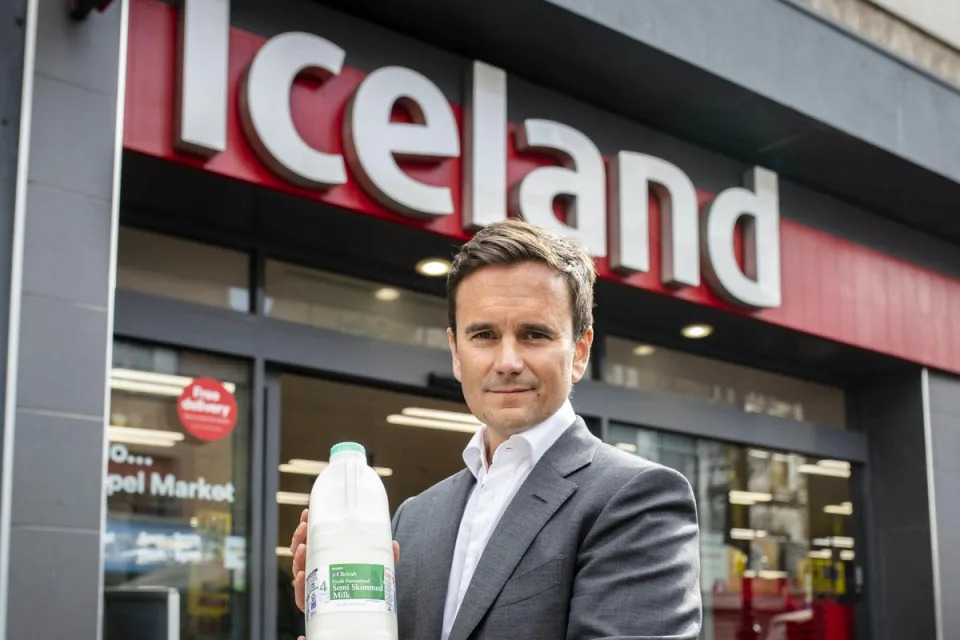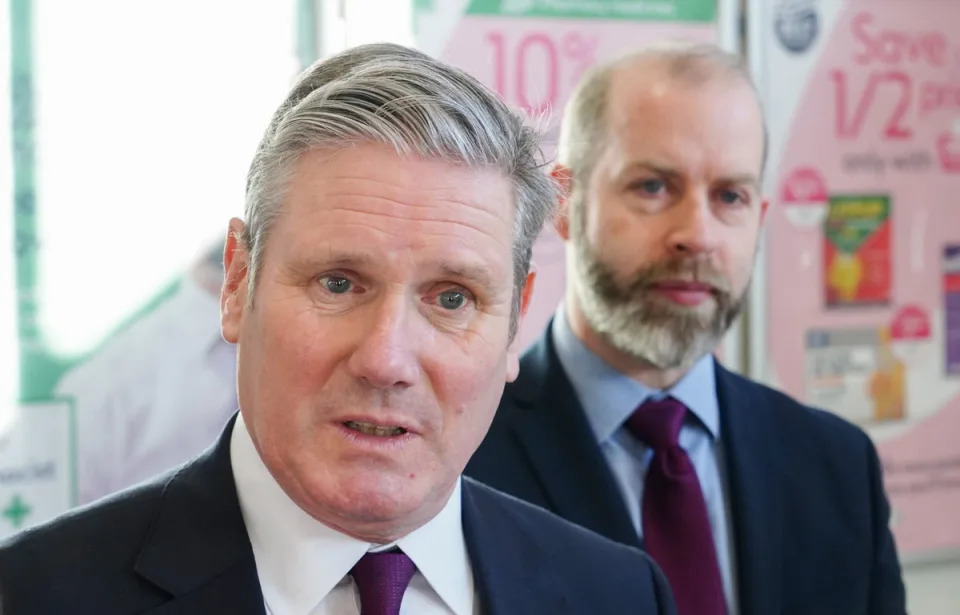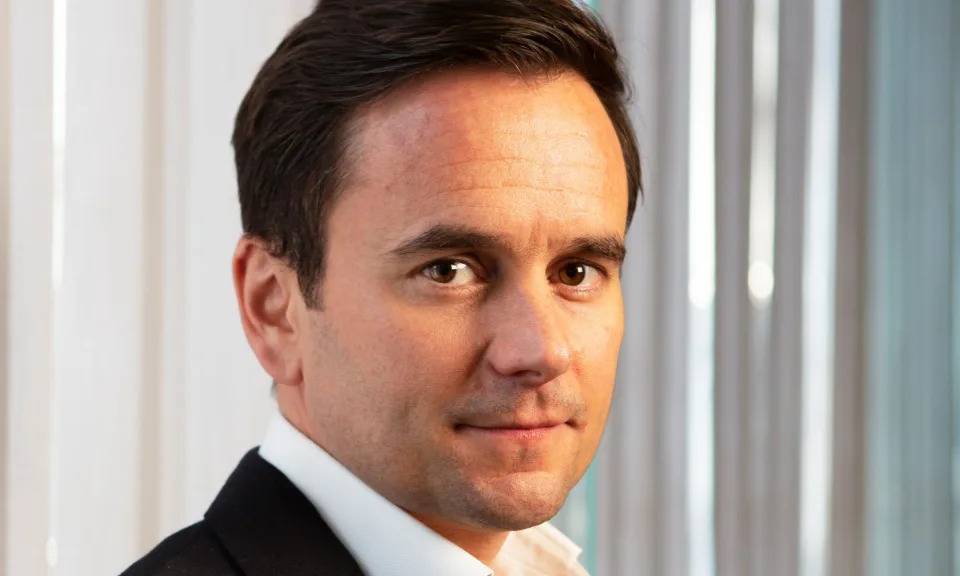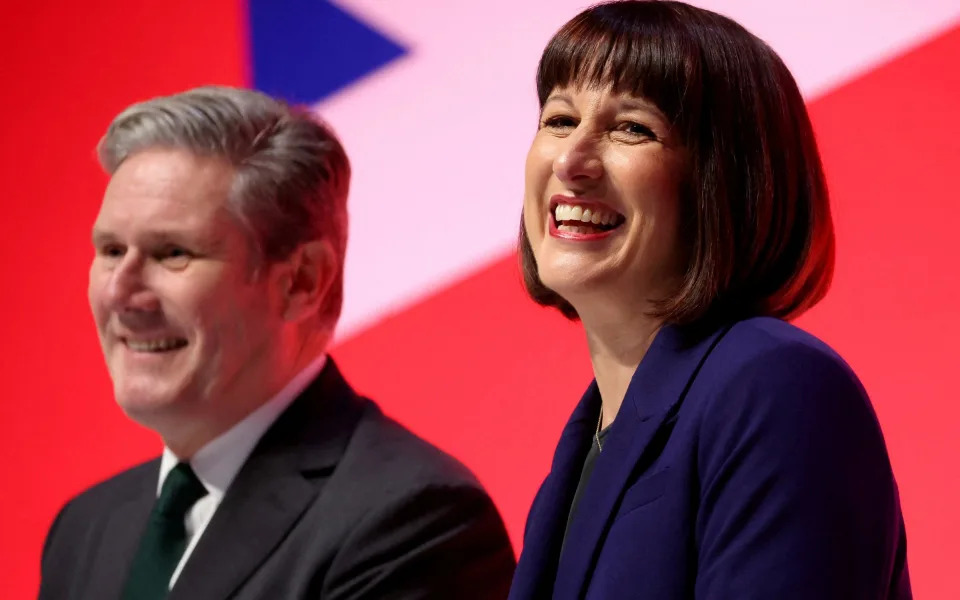Iceland boss and former Tory donor throws weight behind Labour
Archie Mitchell
Mon, 29 January 2024

Iceland’s Executive Chairman Richard Walker has backed Labour ahead of the next general election (John Nguyen/PA) (PA Archive)
The boss of Iceland has thrown his weight behind Labour, saying the party was the “right choice” for households and businesses.
Just months after failing to find a seat to stand to be a Tory MP, Richard Walker has switched his support to Sir Keir Starmer’s party.
The executive chairman of the supermarket and former Tory donor said Sir Keir has “transformed” Labour since taking over from Jeremy Corbyn four years ago.
And Mr Walker praised the Labour leader’s “compassion and concern for the less fortunate”, which he said contrasts with the Conservatives under Mr Sunak.
Writing in the Guardian, he said: “Labour is the right choice for the communities across the country where Iceland operates – and the right choice for everyone in business who wants to see this country grow and prosper.”
Mr Walker said that when he quit the Conservative Party in October, he had not committed to supporting Labour. And he acknowledged criticism of the party under Sir Keir that voters “don’t yet know him well enough” to be enthused about the prospect of a Labour government.
But he added: “Having met the man, I am sure that Starmer has exactly what it takes to be a great leader.”
“He absolutely gets it when I talk to him about the way that the cost of living crisis has put unbearable strain on the finances of so many of my customers and their families, and the urgent need for a government that does everything in its power to ease their burden,” Mr Walker said.
He also heaped praise on shadow chancellor Rachel Reeves, who he said “understands the critical importance of wealth creation” and “knows that we must revive our manufacturing and services”.
Mr Walker went on to say the country is “in a mess” and accused the Conservatives of having “failed the nation”.
He told BBC Breakfast: “I think the Conservatives have failed the nation. They’ve drifted badly out of touch with people like my customers, and they’re drifting further and further to the right.
“What’s interesting is that my values and principles haven’t changed, and, whilst the Conservatives have moved away from me, Labour has steadily moved towards the centrist pragmatic views that I’ve long held.”
He said Labour is “on the right track and the right party”.
“The country is in a mess, the country is in a significantly worse place than it was 14 years ago.”
But Mr Walker said he does not agree with “every single thing that Labour proposes”. And he said he is not joining the party so he can speak out “without fear or favour about the issues that matter to me and the people my business employs and serves”.
Mr Walker’s backing for Sir Keir is the latest blow for Mr Sunak and the Conservatives as business leaders flock to Labour ahead of the next general election.

Business chiefs have been flocking to the Labour Party under Sir Keir Starmer (PA)
It comes after former Bank of England governor Mark Carney backed the party and Conservative grandee Kenneth Clarke praised Ms Reeves for her work as shadow chancellor.
And it follows the advertising giant that helped to put Margaret Thatcher in power, Saatchi & Saatchi, attacking the “cruelty” of the Conservatives and backing Labour to win the next election, expected this autumn.
Mr Walker’s support for the party is also a major about-turn for the grocery chief, who until quitting the Tories wanted to stand as a candidate for the party in the election.
At the time, he attacked the Tories for “flip-flopping” on net zero and HS2 and said his views on food bank usage and sewage were “unwelcome” in the party.
“I was told to pipe down. I am not willing to wear a gag to bag a seat and I am not willing to change my values and principles to suit a party that itself has lost its way,” he said.
Rowena Mason Whitehall editor
Sun, 28 January 2024

Photograph: Richard Saker/The Guardian
The former Conservative donor who chairs Iceland supermarket has publicly backed Keir Starmer to be the next prime minister, saying the Labour leader understands how the cost of living crisis has put an “unbearable strain” on families.
Richard Walker, who quit the Tories last October after previously seeking to be a candidate, said he had reserved judgment on who to back at the next election but now believed that Labour and Starmer had a “credible programme” to improve the UK economy and people’s lives.
Walker’s change in allegiance comes after Labour put huge effort into wooing business leaders and persuading them that the party would not implement anti-business policies.
The party plans to hold a major business conference in central London, hosting leaders from companies including Google, Shell, AstraZeneca, Airbus and Goldman Sachs. More than 400 are expected to attend and the event sold out in four hours.
Writing for the Guardian, Walker, the executive chair of Iceland, said Starmer had moved closer to the centre while Rishi Sunak’s party had gone in a different direction and caused a “total collapse in public confidence” in the government.
He said he had met Starmer and that the Labour leader had demonstrated a “compassion and concern for the less fortunate” as well as an understanding of the cost of living crisis that had hurt his customers. Walker said he was particularly keen on change to regulation to allow promotions of and discounts on infant formula, which has soared in price during the cost of living crisis – a move that would overturn a ban put in place in order to avoid discouraging breastfeeding.
The businessman highlighted Starmer’s leadership qualities, saying he had “demonstrated this in the way in which he has transformed his own party by ruthlessly excising the Corbynite extremism that made Labour unelectable in 2019”.
Walker said he had not had a “radical change of heart” but that Starmer had “progressively moved towards the ground on which I have always stood, at the same time as the Conservatives have moved away from it”.
“Indeed, the Tories’ abandonment of what I have always regarded as basic Conservative principles has fuelled my personal disenchantment,” he added.
Walker said Labour’s missions were clear, while the Conservatives had presided over infighting, chaos and an “apparently endless churn of prime ministers, chancellors and secretaries of state”.
He said Rachel Reeves was a chancellor in waiting who understood the critical importance of wealth creation and that he believed the party would remove barriers in the planning system, as well as “breathing new life into our wearied high streets”.
Walker, who stressed that Iceland as a business was apolitical, said he did not agree with everything that Labour proposed, and that he would not became a party member. He is not understood to be planning to donate to the party.
However, he said he would support Labour at the next election and hoped that it would “deliver the majority they will need to begin delivering their recovery programme for the UK”.
Other business leaders are likely to follow Walker in switching allegiance to Labour as the election draws closer. Starmer’s party is still leading the polls by a large margin.
Ahead of Monday’s business summit, Jonathan Reynolds, the shadow business secretary, pledged to make it an annual event and promised to end the “VIP lanes” for contracts that gave preference to bidders with links to government figures during the pandemic.
“Labour is the party of business,” he said. “There will be no back doors or special access for donors under a Labour government. The public and honest businesses have had enough of Conservative sleaze and scandal. Labour will bring integrity back to how the government and business works together to solve the big challenges in our country. We will always treat taxpayer money with the same respect a businesses treats customers’ money.”
Earlier on Sunday, Reynolds stressed that the party’s commitment to increasing spending on green projects to £28bn by the middle of a parliament was not “the holy grail”, following speculation that it could be dropped after the budget.
He told Times Radio: “How much you can spend is determined by the health of the economy, and for us, our fiscal rules. We want to see UK government debt falling at the end of a parliament. I don’t want to be talking about a sum of money as being the holy grail in terms of investments.
“It’s about, over time, getting to that level of ambition, whilst making clear that how much you can spend, how much you can invest, is governed by your fiscal rules. It is opposition within the envelope of what the government are doing, because that’s your starting point. That is just the reality of opposition.”
Will Hazell
Sat, 27 January 2024

Labour leader Sir Keir Starmer laughs with shadow chancellor Rachel Reeves during the party annual conference in Liverpool last year - REUTERS/PHIL NOBLE
Half of business leaders have said they would prefer a Labour Government under Sir Keir Starmer to a Conservative one led by Rishi Sunak.
The polling by Opinium found that a quarter of business leaders who voted for the Tories at the 2019 general election were now backing Sir Keir’s party.
The findings come as Labour prepares to hold a major business event this week, with 600 executives, investors, and ambassadors flocking to a conference in London on Thursday, indicating that many bosses expect the party to form the next government.
Labour commissioned Opinium to conduct an online survey with a sample of 500 business leaders and senior decision-makers, with respondents spread across micro, small, medium, and large businesses.
Within the sample, 44 per cent said they had backed the Tories in the 2019 election, compared to 27 per cent who had supported Labour.
However, asked for their preferred outcome at the coming general election, the positions had reversed, with 49 per cent preferring “a Labour government led by Keir Starmer” compared to 34 per cent who wanted “a Conservative government led by Rishi Sunak”.
Of the 220 business leaders who had backed the Tories in 2019, 55 (25 per cent) said they now wanted a Labour victory.
‘Loss of trust’
The polling was similar when the business leaders were asked about the Chancellor Jeremy Hunt and the shadow chancellor Rachel Reeves. Forty-eight per cent said they would trust Ms Reeves more to manage the economy, compared to 34 per cent who opted for Mr Hunt.
The survey found that 69 per cent agreed with the statement that the Tories had “lost the trust of the business community”, compared to 25 per cent who disagreed. Two-thirds (66 per cent) also agreed that the Tories were “out of ideas” compared to 28 per cent who disagreed.
The shadow business secretary Jonathan Reynolds said the findings showed that “business has given up on the Conservative Party” and “lost faith in them”.
“Business wants stability more than anything,” he said. “I think we’re in a really unusual position where I think business is looking to a change of government for greater stability than the continuation of the present one.”
On Thursday, Labour will hold a conference featuring 400 business leaders and a further 200 international investors and ambassadors.
The conference is three times the size of a similar business event Labour held last year, with each ticket costing nearly £1,000 excluding VAT and the whole event selling out in just four hours.
High profile attendees include the president of the British Chambers of Commerce Baroness Lane-Fox, Google’s UK managing director Debbie Weinstein, and the chief executive of Siemens in the UK and Ireland, Carl Ennis.
Earlier this month, Mr Reynolds was in Switzerland with Ms Reeves wooing global business leaders at the World Economic Forum in Davos.
He revealed he had taken the opportunity to ask international companies whether they would “consider listing in the UK”.
He said: “If there’s a room I’ve got to get into, to get more business investment, more inward investment into the UK, to tell people about what a Labour government would mean for them if they’re interested, I’m happy to be in that room.”

















